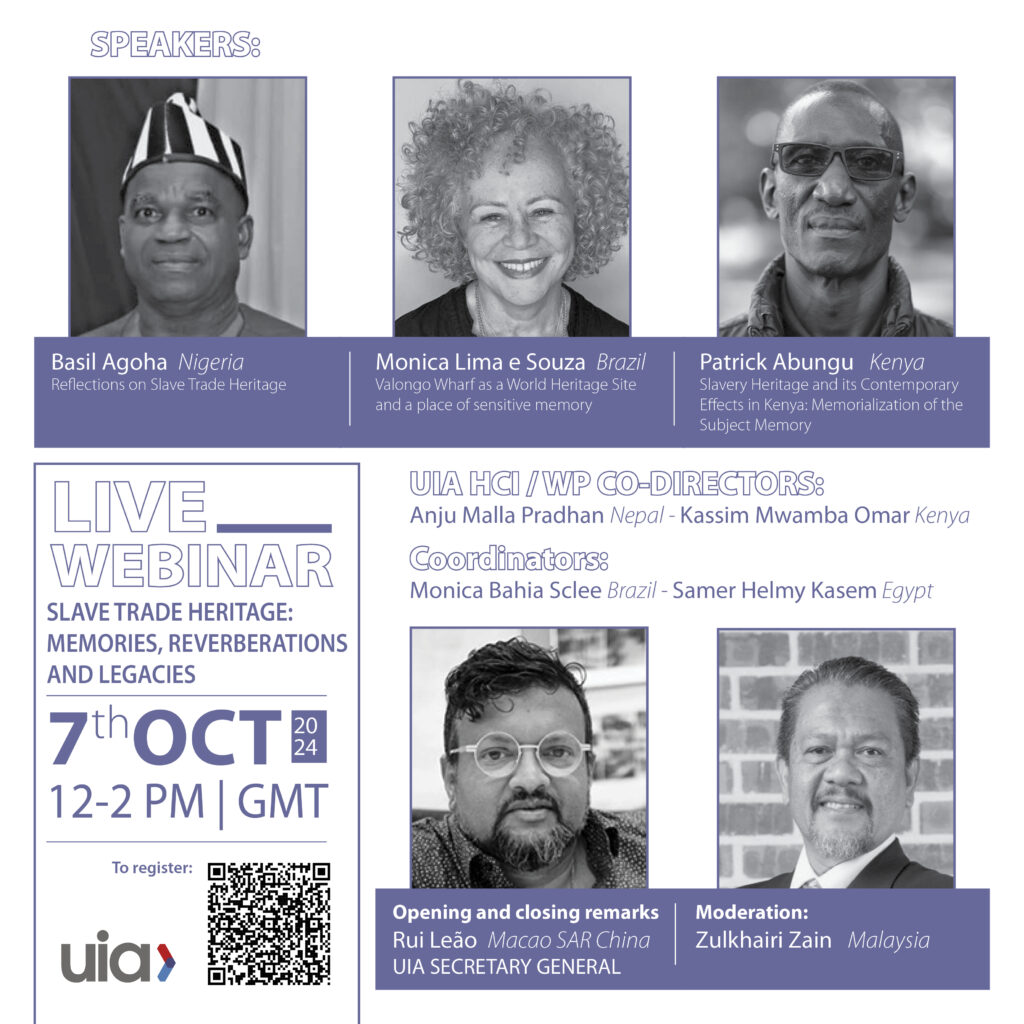The UIA Heritage and Cultural Identity Work Programme will hold a webinar 7 October 2024, which is also World Architecture Day. This roundtable will focus on Slave Trade Heritage, a legacy of the violence against humanity represented by slavery and the forced transportation of millions of Africans to the Americas, Europe, and other parts of the world. It also acknowledges the resistance and invaluable contributions of enslaved people and their descendants to the formation, sociocultural, socioeconomic, and educational development of regions worldwide. This heritage includes historical sites, narratives of enslaved people’s experiences and the atrocities they endured, cultural traditions, as well as monuments and remnants linked to this dark period of human history.
The discussion will address the following key issues:
- Conflict and instability generated by slavery in both the donor and receptor regions;
- Government and institutional policies for addressing this sensitive heritage, with a focus on the impact of the slave trade on the urbanization of receptor countries;
- Strategies for inclusive, equitable, and sustainable urban development and wealth redistribution, illustrated through examples like ethnographic museums, ecotourism projects, and restitution programs;
- Curriculum development and architectural education, emphasizing the importance of integrating alternative narratives of this history into education across various levels.
What strategies can we adopt to better respond to these challenges?
Registration for the event: https:/bit.ly/3BhIkLE

Synopsis
This presentation will address four interconnected topics:
- Slavery as a Philosophy and Slave Trade as a Practice: As a philosophy, slavery manifests in oppressive governance, leading to dangerous migrations, forced labor (including child labor), racism, conflicts, wars, and various forms of discrimination.
- Conflicts, Wars, Terrorism, Banditry, Invasions, and Instability: These global practices contribute to instability at both local and international levels, resulting in internal displacement, refugee crises, and widespread insecurity.
- Addressing This Sensitive Heritage: Exploring possible strategies for inclusive, equitable, and sustainable urban development and wealth redistribution through examples such as ethnographic museums, ecotourism projects, and restitution programs. Given the magnitude of these challenges, there is a pressing need for comprehensive policies at both global and national levels.
- Curriculum and Architectural Education: Emphasizing the importance of incorporating diverse narratives of this history into education at all levels. This includes subjects like civic education, peace studies, historical preservation, sustainability, monumentalism, Afrocentrism, and Afrometropolitanism, with a focus on heritage concepts in architecture
About the Speakers
Basil Agoha Onyekozuru holds a B.Sc., M.Sc., and Ph.D. in Architecture and is an Associate Professor in the Department of Architecture at Chukwuemeka Odumegwu Ojukwu University, Nigeria. He is a Chartered Architect, a Fellow of the Nigerian Institute of Architects (NIA), and a UIA-UNESCO and UIA Heritage & Culture Work Group Correspondent for Region V. He has served as Associate Dean of the Faculty of Environmental Sciences and Chair of the NIA Imo State Chapter. Dr. Onyekozuru also chairs the Board of Trustees for community-focused NGOs and is a member of various architectural committees.
Monica Lima e Souza is a professor and the coordinator of the Laboratory of African Studies at the History Institute of the Federal University of Rio de Janeiro, Brazil. As a historian, she was part of the working group that prepared the dossier for Valongo Wharf’s designation as a World Heritage Site. She has recently published chapters and articles on this experience in books and academic journals. Since 2023, she has also served on the Management Committee of Valongo Wharf – World Heritage as the primary representative of the National Archives of Brazil.
Patrick Abungu is the Heritage Manager of the Non-Commemorated Project, AAA, at the Commonwealth War Graves Commission (CWGC). He is a museologist and heritage professional with a strong background in Museums and Heritage Studies. Before joining the CWGC, Patrick worked at the National Museums of Kenya (NMK) for over twenty years in various roles, including as the Coordinator for Western Kenya Region Sites and Monuments. His research and publications focus on Museums, Heritage and Community Development, Slavery Heritage, and World War history and their impacts on contemporary society.
Moderator:
Zulkhairi Zain is an architect and interior designer accredited by the Board of Architects Malaysia (LAM), as well as an APEC and ASEAN Architect. Since 1997, he has been in professional practice in Kuala Lumpur, Malaysia, as the principal of Multi-Spex Architects. Zulkhairi is an esteemed member of the Malaysian Institute of Architects (PAM) and the Malaysian Institute of Interior Designers (MIID). He is also a registered Heritage Impact Assessor with the Heritage Conservation Department of Penang City Hall. His contributions include serving as a member of the UIA Heritage & Cultural Identity Work Programme and the UIA Indigenous Peoples Work Programme, as well as being part of the Arcasia Architectural Heritage Preservation Group. At PAM, he holds key positions as Chairman of the Education Committee, Heritage Conservation Committee, and Dispute Resolution Committee.